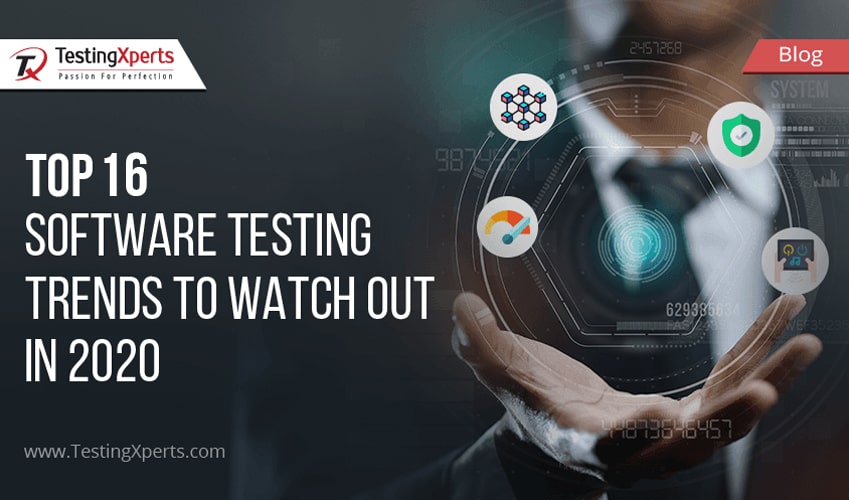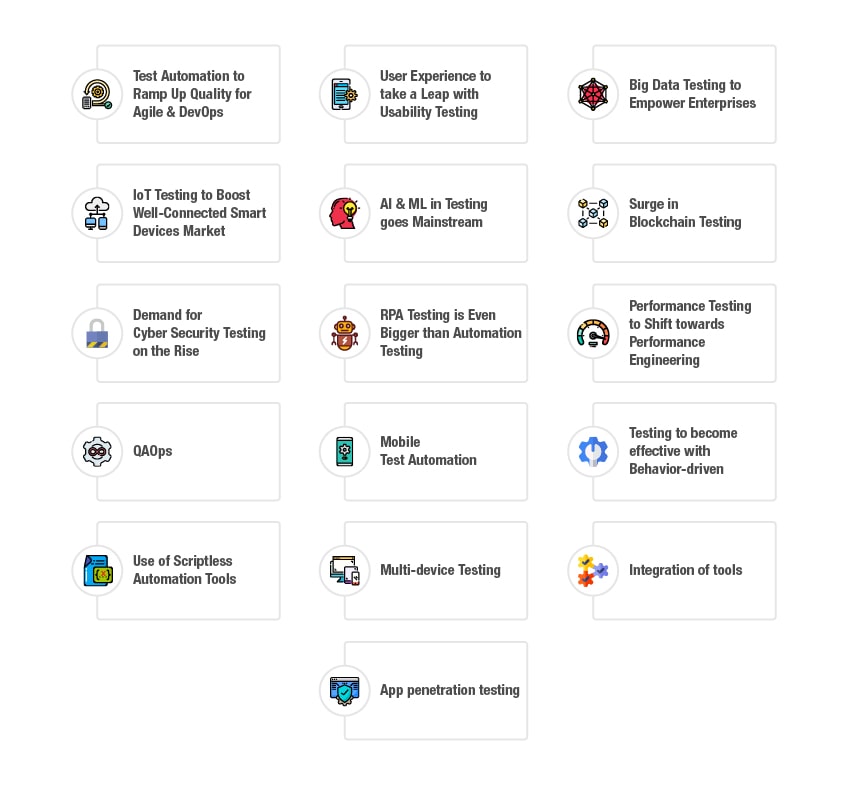Recommended Blogs
Top 16 Software Testing Trends to Watch Out in 2020

Contents
1. Top 16 Software Testing Trends to Look Out in 2020
2. Test Automation to Ramp Up Quality for Agile & DevOps
3. User Experience to take a Leap with Usability Testing
4. Big Data Testing to Empower Enterprises
5. IoT Testing to Boost Well-Connected Smart Devices Market
6. AI & ML in Testing goes Mainstream
7. Surge in Blockchain Testing
8. Demand for Cyber Security Testing on the Rise
9. RPA Testing is Even Bigger than Automation Testing
10. Performance Testing to Shift towards Performance Engineering
13. Testing to become effective with Behavior-driven
14. Use of Scriptless Automation Tools
15. Multi-device Testing 16. Integration of tools
Enterprises across the globe continue to foray into the challenging and turbulent market space with a need for quality products to gain their market place. Software development of applications and products demands effective software testing that has a shift-left approach today.
Software testing is taken up along with the software development life cycle (SDLC) to enable faster releases and deliver quicker ROI. Hence, looking at the criticality of software testing in the SDLC, more and more enterprises are looking out for end-to-end testing cycles and hence continue to invest in next-gen software testing services.
A recent Nelson Halls’ report states Next-gen testing accounts for 24% of the software testing services spending. It is the fastest growth offering with a 12.8% CAGR for 2018-2023. Growth is driven by mobile testing, which still accounts for ~75% of all next-gen testing spending.
Evidently, software testing continues to play a key role in the emergence of software development methodologies like Agile and DevOps. In addition, with the industry 4.0 in place, the trend indicates a shift towards automation, cyber-physical systems, the internet of things (IoT) and the industrial internet of things (IIoT), cloud computing all around and the booming up of Artificial intelligence with Machine Learning trends.
Testing of these technologies demands effective test strategies and testing methodologies to be in place. Interestingly, enterprises should ponder some of the major software testing trends to take the complete benefit of the market segment to derive products of their requirement.
Top 16 Software Testing Trends to Look Out in 2020:

1. Test Automation to Ramp Up Quality for Agile & DevOps
With the latest agile and DevOps processes, faster and quality releases as the underlying motto, most enterprises continue to adopt test automation. Undoubtedly, test automation has already penetrated into the industry in testing repetitive tasks quickly and efficiently.
With DevOps substantiating proper collaboration between departments, test automation tools continue to lead the software testing space. The proper usage of test automation tools helps to achieve faster release cycles, better quality, and quicker ROI.
2. User Experience to take a Leap with Usability Testing
With the rapid influx of mobile and e-commerce applications, the significance of software testing has been witnessed to test the operating systems, platforms, and devices. The mobile apps continue to be the major business enabler for businesses today; an effective and great user interface with a streamlined usability flow is the need of the hour.
Along with a quick app loading time, users continue to show preference to apps that have a great Usability embedded in them. Poor usability can affect customer and brand loyalty; hence usability testing identifies all the bugs before the application is released to your users.
3. Big Data Testing to Empower Enterprises
Enterprises across industries continue to deal with huge data volumes and diverse data types. The mining of any amount of structured or unstructured data defined as Big data needs effective testing. Big data testing helps to make improved decisions with accurate data validations, and helps improve market targeting and strategizing.
4. IoT Testing to Boost Well-Connected Smart Devices Market
It is expected that the number of connected devices will be more than 20 billion by 2020 when compared to the figure of just 6.4 billion during 2016. These figures represent the massive expansion and the need for an effective IoT testing strategy. It includes the testing of Operating systems, communication protocols, along with software and hardware of the IoT devices. Most enterprises have already started identifying the need for an effective IoT testing strategy to enable efficient and well-connected smart devices.
Especially, testing for vulnerabilities in IoT devices is an emerging business need as IoT typically encompasses all products that are connected to the internet in one way or the other. IoT systems collect data while in usage from various interconnected devices and share information with their manufacturers without the users being aware of it.
Further, manufacturers in their haste to get new design features for smart products continue to overlook the complications arising out of security concerns of system’s software and hardware. There is a possibility of vulnerabilities seen in the hardware (chipset) of many new IoT products which is susceptible for multiple threats that needs to be effectively tested.
Even the software that is included in the IoT devices usually does not get any sort of security testing done while at the manufacturers end. Thus, numerous IoT devices continue to get hacked due to the susceptibility affecting the entire network of users. Hence, it is essential to get all the IoT products and devices security tested to avoid threats and vulnerabilities.
5. AI &ML in Testing goes Mainstream

According to a leading Research analyst, Artificial Intelligence(AI) will be omnipresent in all spheres of technological innovations. It will become the top investment priority of CIOs by 2020. The market for AI is expected to be around $6-7 billion in North America alone. Machine Learning (ML) and user interfaces such as Speech recognition and gesture recognition will advance in the future. The prediction of various tasks based on complex neural networks and algorithms has literally changed the outlook of technology and these applications also need rigorous testing and validations.
With the world completely moved towards digital transformation, there is much pressure to balance market requirements and build a system which is predictive and scalable to cater future needs of software. Testing needs to embed AI which perfectly imitates human behavior using machine learning and predictive analytics. Going forward for the upcoming latest applications in connected world evidently needs testing to use AI and ML to automate.
6. Surge in Blockchain Testing
There is a rapid expansion of the virtual currency Bitcoin usage. A recent report by McKinsey states that Blockchain is a nascent technology with the potential to bring about step-function improvements in financial transactions. Blockchain testing helps to enable smart contracts and ensures fraud protection.
Undoubtedly, the Blockchain technology has revolutionized the way businesses are dealing with digital currencies such as Bitcoin. These Blockchain applications are not limited to the financial world and its smart contracts are being used in every field of business from energy sector to governmental services.
This wide range of applications support brings in new challenges to Blockchain debugging. Moreover, once the smart contract is implemented, its execution cannot be reversed and hence, smart contract codes define how seamlessly the software performs even with increased workloads. This entire process of Blockchain testing calls for efficient outsourced next-gen testing services, specialized in debugging the code to deliver productive Blockchain applications.
7. Demand for Cyber Security Testing on the Rise
Undoubtedly with the digital revolution, there has been the emergence of various security threats. The CIOs of enterprises continue to realize the importance of security testing of their applications, network, and systems to ensure not only secure transactions but complete protection of end-users critical data. Thus, security testing has gained a lot of importance as it safeguards brand loyalty and prevents economic losses.
8. RPA Testing is Even Bigger than Automation Testing
RPA can also be named as an extension of Automation as it can be applied to anything which is in a structured form, unlike automation which needs a software product to work upon. RPA can be used with very complex processes that can be automated with AI. Specifically, it is a style of automation wherein a machine, or computer mimics a human action and helps in the completion of rule-based tasks. The Robot led automation has the true potential to change the workplace and does all tasks performed by automation testing tools.
9. Performance Testing to Shift towards Performance Engineering
Product performance has earlier been the major segment of testing but now, it is slowly shifting towards performance engineering which is not an easy process. The performance engineering process involves the collaboration of hardware, software, configuration, performance, security, usability, business value and it ensures to deliver the highest value that exceeds end-user expectations.
10. QAOps
The digital world is effectively in need of software applications that are released faster with no compromise in the quality of the applications. Earlier, the need for testing teams was limited only for performing application testing, but now the importance of QA is effectively increasing.
QA is playing a crucial part in the complete software development. Similarly, DevOps is another automation approach that has gained crucial importance in order to deliver applications faster. And the combination of these two methodologies, i.e.
QA and DevOps brings a new practice called QAOps or DevTestOps. With this practice, the testing, development, and operation teams can be on the same line by erasing the boundaries. With this latest approach, continuous testing can be combined DevOps and thus assures changes in software are made effective with the practice of Continuous Integration (CI) and Continuous Deployment (CD). Thus, software testing is not practiced at indefinite intervals and the applications are delivered with quality and without delays.
11. Mobile Test Automation
Mobile phones have become a very popular medium and this has enhanced the rise of mobile applications. Enterprises are choosing the pathway through mobile apps as an easy way to reach users. And, to ensure that mobile apps work efficiently for users, automation testing for mobile applications is essential. With the rising mobile app market, the need for mobile testing with automation tools becomes crucial.
Considering this effective needs, there have been many automation testing tools for mobile applications such as Robotium, Kobiton, TestComplete, Appium, etc. Mobile automation testing can be on the list of top trends until there is another powerful medium like a mobile application.
12. Testing to become effective with Behavior-driven
This has been in the list of software testing trends for many years and it is continuing the same still. Yes, Behavior-driven development (BDD) is effectively getting enhanced with the adoption of AI and ML by many organizations. With the BDD implementation, it becomes easier for many organizations to upgrade their insights and business with higher user acceptance. This is because, the adaption of BDD requires the implementation of BDD tools, frameworks, and requires test cases built based on visitor’s interaction. A few of the top BDD tools and frameworks include Cucumber, Concordion, FitNesse, HipTest, etc.
13. Use of Scriptless Automation Tools
Software testing is effectively seeking many advancements and improvements continuously. Every change and advancement in this field is helping the teams in releasing applications faster with quality assurance. Among the many such advancements, scriptless automation is one of the important trends in 2020 that is reducing the human efforts and helping in accelerating quality applications that can help in achieving greater ROI. With Scriptless test automation, there is no more the issue of coding for test engineers for automating test cases. This is an effective advancement helping to deliver quality results faster by reducing the coding time.
14. Multi-device Testing
The use of mobile devices is effectively increasing year by year and this is increasing the need for automation testing on a range of devices. However, this is not only limited to mobile devices, it is for many devices such as wearables, smartphones, smart speakers, etc. Thus, this year, automation testing over a range of devices become essential for many testing teams.
15. Integration of tools
The growing demands in the businesses are effectively in need of solutions that help in delivering faster and quality applications. In order to overcome this difficulty, it has become important for organizations to consider the integration of tools so that it eases in achieving seamless functionality within businesses. Thus, the businesses of the present digital world are effectively in need of testing tools that can easily get integrated with other tools as they assure better application management. This is a very important software testing trend in 2020 to help enterprises and benefit them in the reduction of cost, management of application, etc.
16. App penetration testing
Almost for every industry, applications have become major important and these are playing a crucial role in their development as well. But, to ensure these work efficiently for users, the internet-based applications have to overcome several attacks and vulnerabilities. Web applications have the most chances of facing vulnerabilities such as hacking. Thus, it is important for enterprises to implement successful security strategies for achieving systems that are secured and work efficiently for achieving business goals. And, to do this, it is necessary to include Application Penetration Testing into software testing practices. With this testing practice, it becomes easier for the teams to validate the effectiveness of the app’s security controls and identify the risks that are exposed to vulnerabilities.
Conclusion
Software testing method like any other services segment is attaining a new level with more traction towards the new trends stated above. Manual testing is slowly being replaced by automated testing, leveraging enormous open source and paid tools. Thus to ensure quality products, enterprises need to be updated with the latest software testing trends. It is important to partner with a next-gen testing services provider to be assured of quality for your products.
Discover more
